Program Overview
The GCE-LTER Program, funded by the National Science Foundation, focuses on understanding the long-term effects of climate change, rising sea levels, and human landscape modifications on coastal ecosystems. The annual summer Schoolyard Program connects K-12 STEM educators with leading researchers in the field. This hands-on workshop offers an exciting opportunity to participate in cutting-edge coastal research alongside scientists and graduate students. Participants will gain practical experience in the scientific process, learn how to integrate real-world data into their classrooms, and—quite literally—get their hands dirty in the salt marsh!
The program has two key emphases. The first is that educators are immersed in real, ongoing scientific activities, not make-work or canned lectures. The process of discovering new information is exciting, but also means confronting uncertainty, ignorance and confusion—it is very different from a planned laboratory exercise. Learning this can be very liberating because it empowers educators to facilitate their own open-ended science activities. The second emphasis is on continued participation of educators. Long-term participation allows mentoring on multiple levels and provides educators with a sense of continuity within the research process and a depth of understanding about those processes that can never be replicated in textbooks or one-off events.
Schoolyard 2026: Call for Applications
Are you a K-12 STEM educator looking for a free immersive professional development opportunity in coastal ecology? The Georgia Coastal Ecosystems Long Term Ecological Research (GCE-LTER) Program invites you to apply for the 2026 Schoolyard Program summer workshop!
Dates: Saturday, July 11 – Friday, July 17, 2026
Location: Sapelo Island, Georgia
Program Details:
Participants will be housed in dorms at the University of Georgia Marine Institute on Sapelo Island. During the program, educators will assist with research in outdoor field settings and engage in discussions about incorporating scientific methods and data into their teaching practices. All program expenses are covered by NSF (room and board)
- Participants will receive a $100 stipend and a $100 book credit to support classroom resources.
How to Apply:
Submit your application by completing the survey below by February 15, 2026. Selected applicants will be notified by March 1, 2026. Space is limited to 14 participants. Selected applicants will be required to submit a $100 refundable deposit to hold their spot. Applicants are encouraged to review program expectations below before applying.
Questions? Email to Austin Heil (austin.heil@uga.edu)
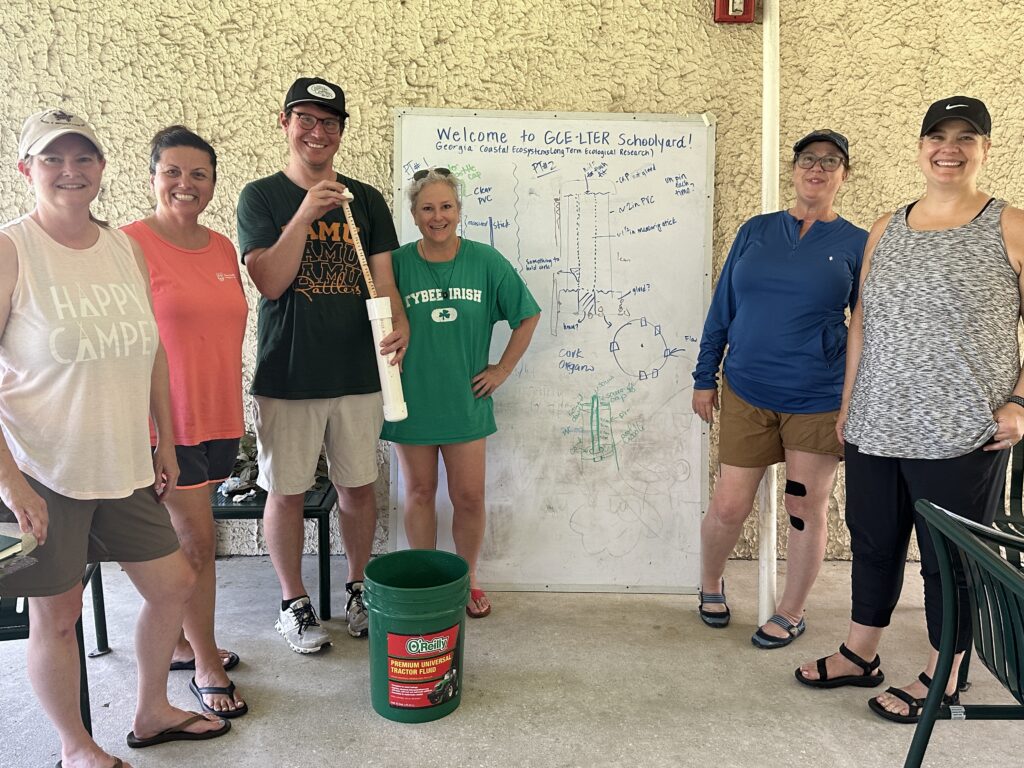
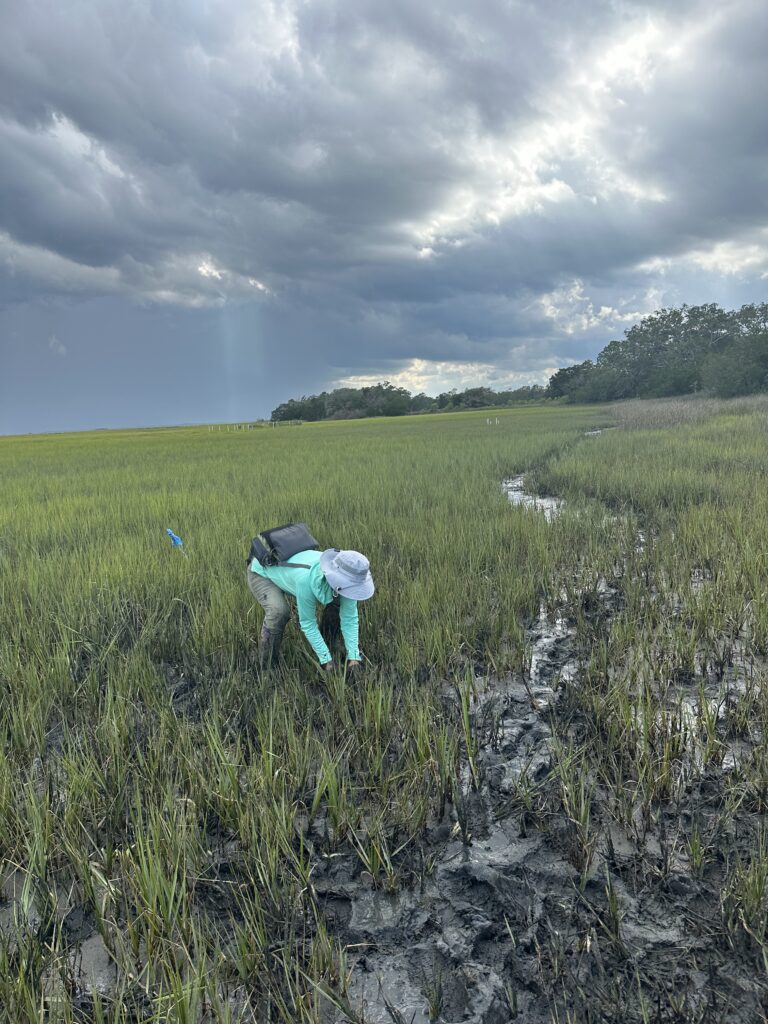
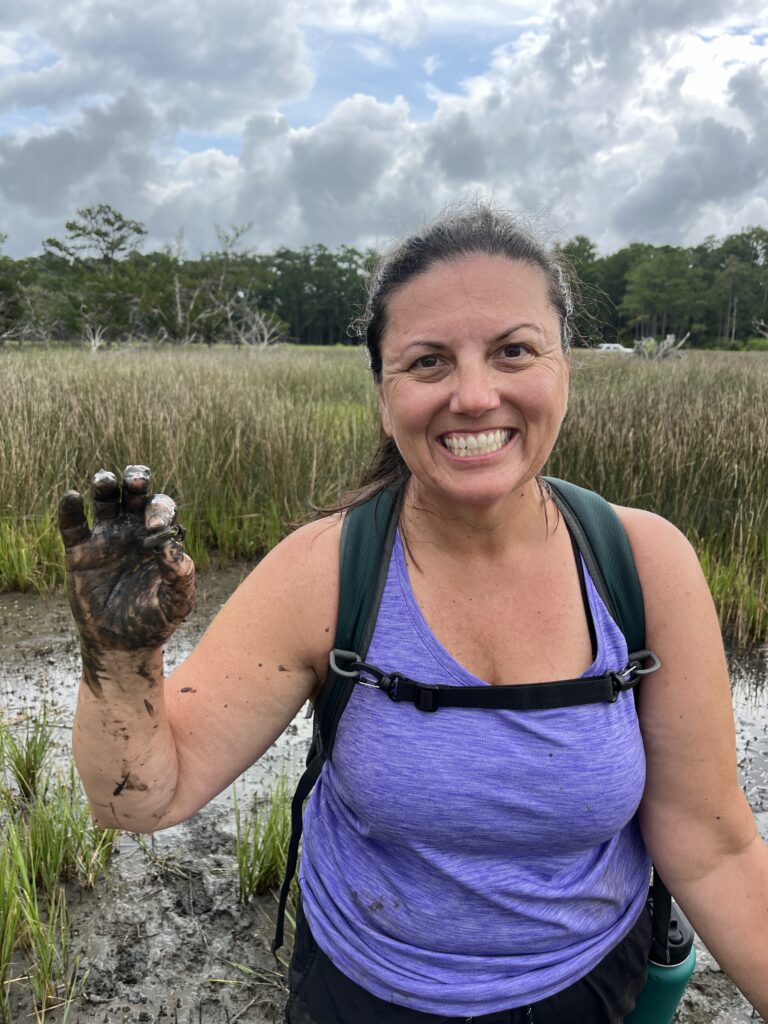
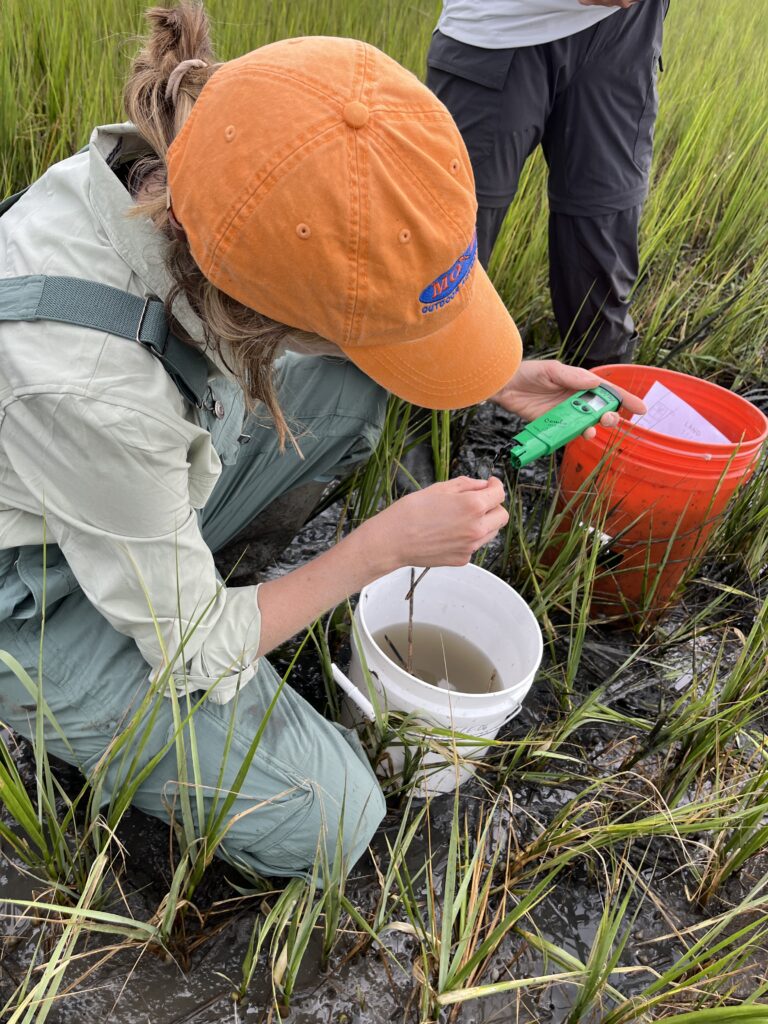
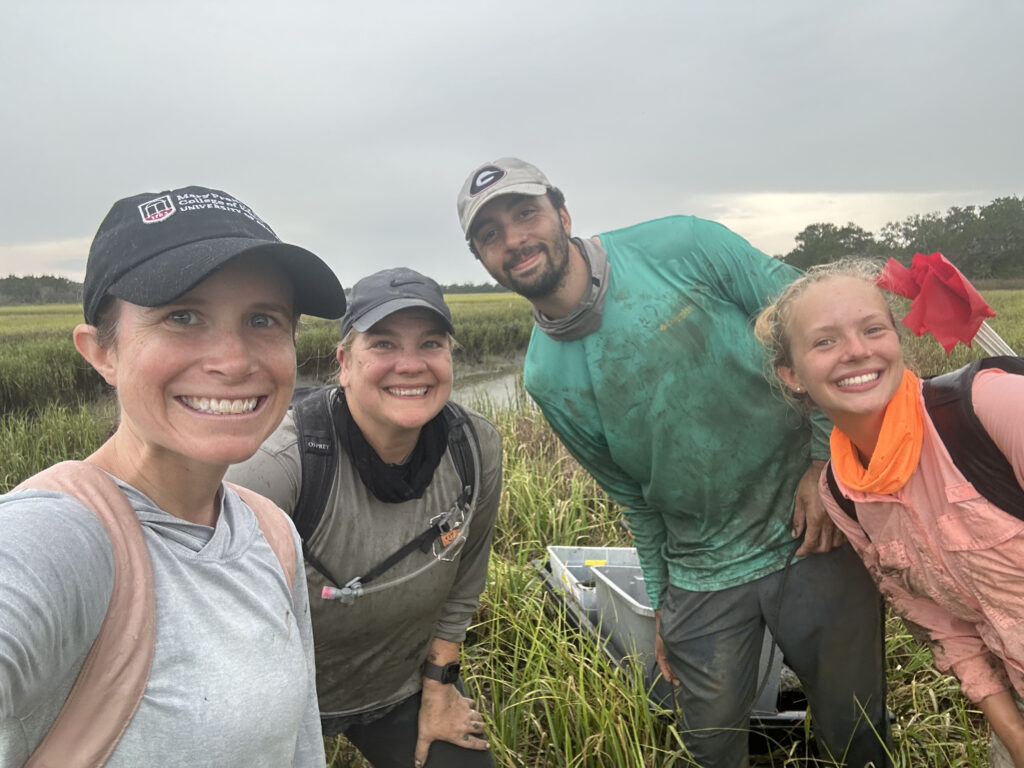
Reasons Why YOU Should Apply from Previous Participants
“I encourage you to come so you can experience the immersive-ness of the week. We ask students to get out of their comfort zone and take risks, and as teachers, this is what a week on Sapelo does for us. Interacting with the professors, interns, and graduate students during the week brings science down to the raw idea that we are all intertwined with the nature that surrounds us. For teachers who feel burned out, stagnant, and ready to throw in the towel, GCE-LTER will rejuvenate and recharge them. Thank you, Sapelo, for a priceless gift!”
“My favorite part of this week was the independence and faith that was given to us by the organizers and researchers. This is not a boring conference where you get a name tag and listen to speakers for days on end. You will be in nature with scientists, you can explore on your own, and you can make this experience what you want. It felt great to be given freedom in a beautiful place.”
“You will love experiencing the reality of the scientific process and the perspective towards not only the power, but the importance of ignorance/failure.”
Past Schoolyard Programs
Schoolyard 2025
Ten teachers (7 new and 3 returning) took part in the 2025 summer workshop, spending the week fully embedded in the field and lab work that drives research on Sapelo Island. The experience began with a full-island tour led by John “Crawfish” Crawford, a lifelong naturalist and educator whose stories and observations set the tone for the week. From there, teachers worked shoulder-to-shoulder with scientists, graduate students, and interns representing five universities—University of Houston, Creighton University, Utah State University, Georgia Tech University, and the University of Georgia, each contributing to the broader goals of the GCE LTER program. Across the week, participants engaged in hands-on research including trawling estuaries to assess nekton recruitment, monitoring marsh slump blocks, collecting data related to salt marsh recovery, and assisting with sea turtle nest monitoring. Additional activities included setting up new marsh recovery experiments in the salt marsh and helping the Hug Hammock community sow seeds for future crops. Evenings offered space for informal conversation and reflection, including a group dinner at Lula’s, where research talk blended easily with shared stories and laughter.
The impact of the experience extended beyond the island. Seven teachers were invited to present at the GCE Annual Meeting in Athens, GA in December 2025, sharing with researchers how they translated this work into their own classrooms and communities. As one participant reflected, “Hands down, the best professional learning I’ve ever done over a 19-year career.
Schoolyard 2024
Thirteen teachers (8 new and 5 returning) participated in the 2024 summer workshop. The cohort was totally immersed in field and lab processes throughout the week, beginning with a tour of the entire island led by John “Crawfish” Crawford, lifelong naturalist and educator. Participants were privileged to work with scientists, graduate students and interns from five universities: University of Houston, Creighton University, Utah State University, Georgia Tech University, and the University of Georgia, all contributing to the overarching goals of GCE LTER. The work included developing a crest gauge, walking transects, monitoring slump blocks in the marsh, collecting data pertaining to salt marsh recovery, and monitoring sea turtle nests. Teachers also attended dinner at Lula’s! Participants brought the crest gauge back to their own classrooms, monitoring coastal and inland flooding events in their local community. “This workshop is unique because it is immersive. You are not sitting in a room and hearing about how to do science, you are actually out in the field and lab doing the science. It doesn't focus on one specific age group, but gives a beautiful understanding of our barrier islands and allows opportunities to collaborate with other educators to find ways to incorporate it into your individual classroom.”
Schoolyard 2023
Thirteen teachers (5 new and 8 returning) participated in the 2023 summer workshop. The cadre was totally immersed in field and lab processes throughout the week, beginning with a tour of the entire island led by John “Crawfish” Crawford, lifelong naturalist and educator. Participants were privileged to work with scientists, graduate students and interns from five universities: University of Houston, Creighton University, University of South Carolina, Georgia Tech University, and the University of Georgia, all contributing to the overarching goals of GCE LTER. The work included installing a well, walking transects, monitoring slump blocks in the marsh, studying root bacteria, collecting data pertaining to salt marsh recovery, composition changes and collecting data using drones. Many teachers of all grade levels now incorporate data collection and analysis in their classrooms with a much better understanding of how and why. “I have a renewed passion for preservation of the environment and this will shine through in a heightened level of enthusiasm.” “It will help me to approach lessons to empower students to be inquisitive and become scientists.” Networking, great food, music, and lots of laughter were all part of the experience adding to recharging for the next school year.
Schoolyard 2022
The 2022 cadre of teachers was made up of 6 returning teachers who served as mentors and 7 new participants from all around the state. Each summer workshop is a mixture of new ideas, adding on to past projects, and creating ingenious methods and equipment. As usual the week began with a tour around the entire island by truck with John Crawford, naturalist & historian. The activities through the week included mucking in mud, tramping through maritime forest, boat rides, socializing with teachers and researchers, late nights, early mornings, long days, lots of laughter, brainstorming, and much more. The work included setting up and cleaning up of a variety of ongoing projects. Some of the projects that participants helped with: Changes in plant community composition; The role of parasites in marsh ecosystems; Mussel-mediated shifts in phytoplankton communities; Water quality data; Vegetation monitoring; Marsh elevation survey; Measuring oyster and invertebrate samples; Helping in the Hog Hammock community garden. Quotes from participants: “Bringing teachers and researchers together to improve the understanding of the science and (participating) in the science processes was ultimately the most valuable.” “I get more out of this experience than any other science professional learning I have ever attended. It re-energizes me and gives me new teaching ideas every year!”
Schoolyard 2021
After a year of covid and isolation, 12 participants from all around Georgia attended the July 10-17, 2021 summer workshop at UGAMI. Returning participants served as mentors for new comers to the program. Covid restrictions were in place, but what a relief to be working in the marshes, tidal creeks, beaches and forests of Sapelo Island and breathing good, fresh air. Many teachers had an opportunity to help with projects involving transportation to sites by boat. Projects included assessing tidal fresh forests in the Altamaha River, elevation levels at a bridge site, vegetation monitoring, water sampling, optical light measurements, recovery monitoring in salt marsh, impact of sea level rise, assisting with a Hog Hammock community garden, and a few opportunities to help with sea turtle surveys. The days in the field can be tiring and uncomfortable, but the work is rewarding. The following quotes are from the evaluation question of the most valuable take-a-way: “So many valuable accomplishments – networking, photography, conversation – I loved it all!” “Real world science participation and education. Not a textbook type learning.” “Networking with scientists and other science teachers was the most valuable aspect of the program. I left with renewed excitement and ideas for teaching middle school science and the process of science.”
Schoolyard 2020 cancelled due to COVID-19
The workshop was cancelled due to COVID-19.
Schoolyard 2019
The summer workshop is usually made up of both past participants and newcomers. The 2019 group was limited to 14 dedicated past participants. Though the participants spent some time in the field, most of the time was spent taking a very close look at the Schoolyard program itself. Strengths, weaknesses, and opportunities for the program were identified through intensive review and discussion. There was opportunity for focused conversation between the participants, scientists and current graduate students for sharing perceptions. Numerous suggestions for improving the program, working with scientists, ideas from other LTER programs, and ideas for implementation in the classroom were all recorded. The hard work done by all were enlightening and invaluable for the continuing improvement of this already very successful program.
Schoolyard 2018
The 2018 educator workshop took place July 7-14 at the UGA Marine Institute. There were 14 participants as well as a long wait list of others who wanted to take part in this very successful field experience program. The group was made up equally of past participants and newbies. All worked hard gathering data in a multitude of habitats ranging from uplands, the lower Altamaha River floodplain swamp forests, lower and upper marshes, dunes and beaches. The valuable teacher/scientists interactions have been very positive experiences. “As I gain more knowledge with each visit, I am able to demonstrate & explain to my students that science takes time. Curiosity and asking questions is the first step in understanding”. “This is a one of a kind immersion experience. I truly value working with the scientists”. “I have learned so much in the span of just one week from teachers, other researchers, and myself that I never would have thought about. I have opened up more socially and learned the value of teamwork in science.”
Schoolyard 2017
The 2017 summer workshop took place July 8-15 at the UGA Marine Institute on Sapelo Island. Eleven teachers from around Georgia and two teachers from Tennessee were deeply immersed in the field work for the projects supporting the mission and goals of the GCE LTER. Participants had opportunities to participate in various process stages of research involving water quality, plant monitoring, sea turtle patrol, spider population studies, and more. “There was nothing I didn’t like! I came away with a new understanding and appreciation of research-specifically data collection.” “Now after 3 years in attendance, I fully understand the importance of long term investigations and collecting multiple data points.”
Schoolyard 2016
The 2016 summer workshop took place July 9-16 at the UGA Marine Institute on Sapleo Island. There were 7 new and 6 returning participants. Some of the work experiences included plant monitoring, vegetation surveys, artificial creek measurements, collecting data from flux towers, and collecting and sorting biomass. Evaluations by participants continue to reflect positive outcomes with comments such as, “It has really changed the way I view and teach the scientific process to my students. It has also increased my confidence in myself and my abilities in the science aspect of my job.” “The opportunity to actually participate in the data collection and actual research process sets it apart from other programs.”
Schoolyard 2015
The 2015 summer workshop took place July 11-18 and included 9 new and 4 returning participants at the UGA Marine Institute on Sapelo Island. The teachers worked on projects ranging from elevation surveys to plant monitoring to harvesting a greenhouse experiment. Participants reported an increase in their knowledge of both coastal systems and the scientific process. One of the participants wrote in their evaluation, “I have decided after my time here that I can easily base my zoology/botany class on labs instead of the textbook” and another “Most of the time when we go to a workshop, we listen to others talk and we don’t participate in a meaningful way. This ‘workshop’ requires us to ‘work’ as we learn.”
Schoolyard 2014
The 2014 summer workshop took place during the week of July 12-18 at the UGA Marine Institute on Sapelo Island. We had 10 new teachers and 4 returning participants who worked on several different projects, including plant community monitoring, measuring trace gases, amphibian surveys, crab collection and studies, sea turtle patrols, and benthic micro-algae collection and processing. Participants kept journals, shared experiences, ideas and resources.
Schoolyard 2013
The 2013 summer workshop took place during the week of July 13-19 at the UGA Marine Institute on Sapelo Island. Once again science and math teachers were immersed in hands-on research activities alongside GCE scientists and graduate students. Teachers worked in the field and in the labs with on-going discussions of how to transfer the experiences to the classroom. Field work included installing groundwater wells, taking greenhouse gas flux measurements, salt marsh surveys, amphibian surveys, locating sea turtles nests, monitoring crab feeding activity and mussel filtration. Lab work included logging data from field monitoring, viewing satellite imagery, snail processing and more.
Schoolyard 2012
The 2012 summer workshop ran from July 8-13, 2012. This year’s workshop was based at the UGA Marine Institute on Sapelo Island. The program immersed science and math teachers in hands-on research activities alongside GCE scientists and graduate students. Teachers split their time between doing research and discussing ways to implement the information into their classrooms. PLU credit was facilitated for in-service teachers and graduate credit may be able to be earned as well. Expenses for the actual program (room and board) were covered by a grant to the GCE LTER from the National Science Foundation.
Schoolyard 2010
The Science Education and Applied Research in Coastal Habitats (SEARCH) research experience for teachers workshop and graduate course was conducted on July 8-16, 2010. To learn more about this summer’s research projects, please visit the Schoolyard 2010 Research Projects.
